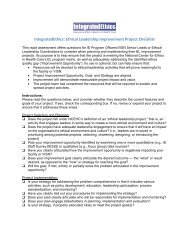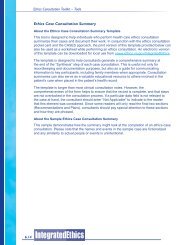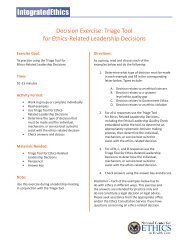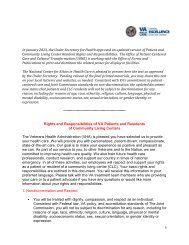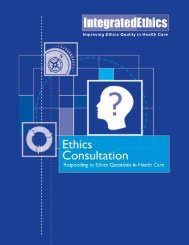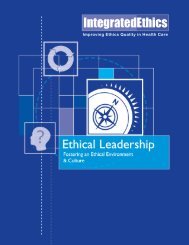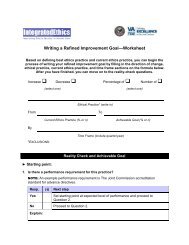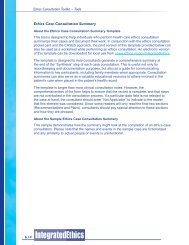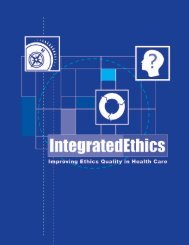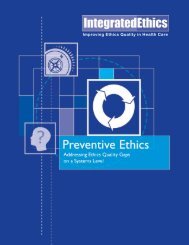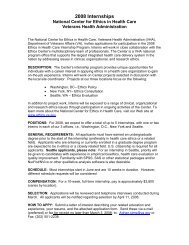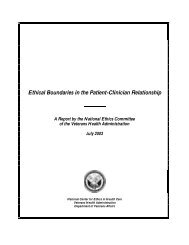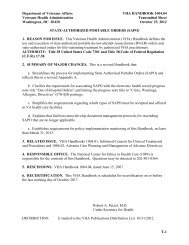Ethical Leadership Toolkit - National Center for Ethics in Health ...
Ethical Leadership Toolkit - National Center for Ethics in Health ...
Ethical Leadership Toolkit - National Center for Ethics in Health ...
You also want an ePaper? Increase the reach of your titles
YUMPU automatically turns print PDFs into web optimized ePapers that Google loves.
<strong>Ethical</strong> <strong>Leadership</strong> <strong>Toolkit</strong> – Introduction to Integrated<strong>Ethics</strong><br />
<strong>Ethics</strong> is also closely related to quality. A health care provider who fails to meet<br />
established ethical norms and standards is not deliver<strong>in</strong>g high-quality health care. By<br />
the same token, failure to meet m<strong>in</strong>imum quality standards raises ethical concerns.<br />
Thus ethics and quality care can never truly beseparated.<br />
The Concept of <strong>Ethics</strong> Quality<br />
When most people th<strong>in</strong>k of quality <strong>in</strong> health care, they th<strong>in</strong>k of technical quality (e.g.,<br />
cl<strong>in</strong>ical <strong>in</strong>dicators) and service quality (e.g., patient satisfaction scores). But ethics<br />
quality is equally important.[20] <strong>Ethics</strong> quality means that practices throughout<br />
an organization are consistent with widely accepted ethical standards, norms, or<br />
expectations <strong>for</strong> a health care organization and its staff—set out <strong>in</strong> organizational<br />
mission and values statements, codes of ethics, professional guidel<strong>in</strong>es, consensus<br />
statements and position papers, and public and <strong>in</strong>stitutional policies.<br />
For example, let’s say a patient undergoes a surgical procedure. From a technical<br />
quality perspective, the operation was perfectly executed, and from a service quality<br />
perspective, the patient was perfectly satisfied with the care he received. So the care<br />
was of high quality, right Well, not necessarily. Imag<strong>in</strong>e that the patient was never<br />
really <strong>in</strong><strong>for</strong>med—or was even mis<strong>in</strong><strong>for</strong>med—about the procedure he received. This<br />
would <strong>in</strong>dicate a problem with ethics quality.<br />
The idea of ethics quality as a component of health care quality isn’t exactly new.<br />
Donabedian, who is widely regarded as the father of quality measurement <strong>in</strong> health<br />
care, def<strong>in</strong>ed quality to <strong>in</strong>clude both technical and <strong>in</strong>terpersonal components,<br />
<strong>in</strong>terpersonal quality be<strong>in</strong>g def<strong>in</strong>ed as “con<strong>for</strong>mity to legitimate patient expectations<br />
and to social and professional norms.”[21] Other experts have proposed “ethicality”—<br />
the degree to which cl<strong>in</strong>ical practices con<strong>for</strong>m to established ethics standards—as<br />
an important element of health care quality.[22] And it’s been argued that specific<br />
per<strong>for</strong>mance measures <strong>for</strong> ethics should be rout<strong>in</strong>ely <strong>in</strong>cluded <strong>in</strong> health care quality<br />
assessments.[20]<br />
<strong>Ethics</strong> Quality Gaps<br />
<strong>Health</strong> care organizations <strong>in</strong> this country have significant “opportunities <strong>for</strong><br />
improvement” with respect to ethics quality,[23] and VA is no exception. Over the<br />
past several years, VA’s <strong>National</strong> <strong>Center</strong> <strong>for</strong> <strong>Ethics</strong> <strong>in</strong> <strong>Health</strong> Care has been collect<strong>in</strong>g<br />
data on the VA health care system—through <strong>for</strong>mal and <strong>in</strong><strong>for</strong>mal surveys, <strong>in</strong>terviews,<br />
and focus groups—to understand where there are ethics quality gaps. What have we<br />
found<br />
VA employees:<br />
• regularly experience ethical concerns<br />
• want more tools and support to address their concerns<br />
• perceive that the organization doesn’t always treat ethics as a priority<br />
<strong>Ethics</strong> committees or programs:<br />
• are seldom described as <strong>in</strong>fluential or well respected<br />
• tend to focus narrowly on cl<strong>in</strong>ical ethics and fail to address the full range of<br />
ethical concerns <strong>in</strong> the organization<br />
1.2



